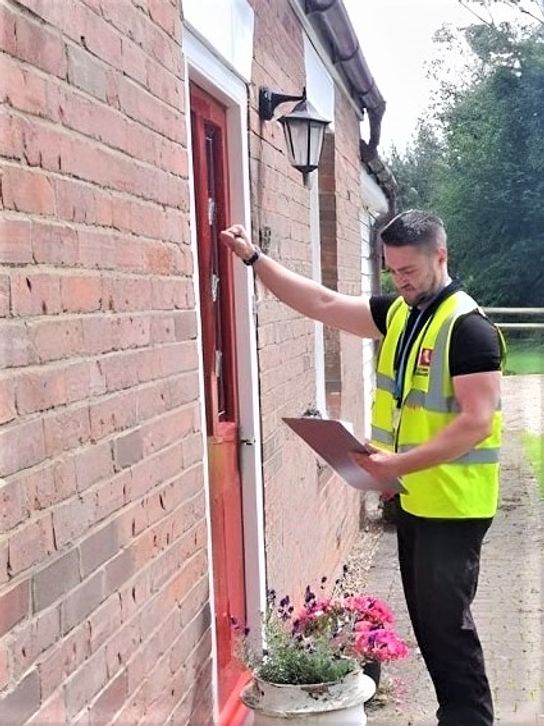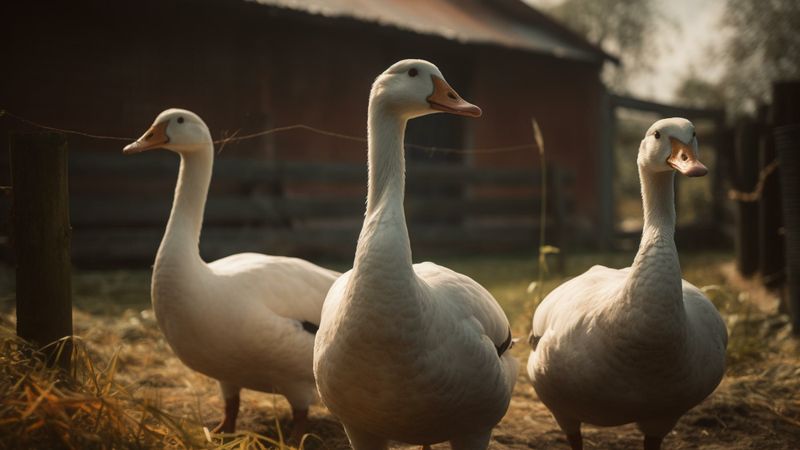UPDATE 2 - 24th July 2023
- APHA deep clean and cull of birds completed
- KCC Trading Standards officers are now carrying out foot patrols inside the 3km protection zone to raise awareness of the need for bird keepers to be vigilant, follow strict biosecurity and report any suspected cases to Defra
- Residents can help by not touching sick or dead wild birds and visiting gov.uk to report findings.

Kent Trading Standards officers have been ensuring residents living near to the affected premises know the rules they have to follow while the protection zone remains in force
UPDATE 1 - 21st July 2023
Kent County Council (KCC) is now working with APHA and the Department for Environment, Food and Rural Affairs (Defra) to manage the local response.
All birds on site will be humanely culled by the APHA to help limit the spread of infection. Animal Health officials have also visited the site to carry out further testing and deep cleaning.
The UK Health Security Agency (UKHSA) has reassured that the risk to human health is very low and the Food Standards Agency (FSA) assures eggs, thoroughly cooked poultry meat and poultry products are safe to eat.
In line with routine Defra guidance, a 3km protection zone and a 10km surveillance zone has been put in place around the premises to further reduce the risk of the disease spreading.
All bird keepers in a disease control zone must follow rigorous biosecurity standards and not move birds, eggs or meat off their premises without special permission from APHA. All poultry and captive birds in the 3km protection zone must also be housed. Keepers can check if they are in the protection or surveillance zone on the APHA interactive map.
All zone requirements are detailed in the declaration for the zone at Bird flu: near Elham, Folkestone and Hythe, Kent (AIV 2023/37) - GOV.UK (www.gov.uk) together with further guidance Bird flu: rules in disease control zones in England - GOV.UK (www.gov.uk).
Working closely with APHA, KCC Trading Standards is ensuring local bird keepers are aware of the restrictions and following the rules.
KCC Highways and Public Rights of Way and Access teams are installing temporary road signs along the zone boundaries for awareness.
The protection and surveillance zones will remain in place until lifted by Defra.
People working directly with the flock at the premises are being offered routine preventative treatment.

“All Kent bird keepers should continue following Defra rules and immediately report any signs of the disease in their birds to the Defra Rural Services Helpline on 03000 200 301”
Head of Kent Trading Standards Steve Rock said: “Good housekeeping is an essential defence against bird flu and key to limiting its spread.
“All Kent bird keepers should continue following Defra rules and immediately report any signs of the disease in their birds to the Defra Rural Services Helpline on 03000 200 301.
“People who have over 50 birds are legally required to register on gov.uk but anyone who keeps poultry, even as pets, should sign up – if they haven’t already – so they be contacted.”

“Avian influenza is primarily a disease of birds and I want to reassure Kent residents that the risk to public health is low”
Kent County Council Director for Public Health, Dr Anjan Ghosh, said: "Avian influenza is primarily a disease of birds and I want to reassure Kent residents that the risk to public health is low.
“However, it is important we all play our part in helping to reduce the spread of the disease so please don’t pick up dead or sick birds with your bare hands.
“If you find 1 or more dead birds of prey, swans, geese or ducks, or 5 or more dead gulls or wild birds of any other species, in the same place please report it to the Defra helpline on 03459 33 55 77 or use the reporting form on gov.uk.
“If you’re out and about in the countryside or on the coast, stick to footpaths and keep dogs on leads to limit contact with wild birds; and if you feed birds in your garden, keep feeders clean and always wash your hands after handling them.”
For the latest national bird flu situation, and guidance for both keepers and members of the public, visit gov.uk/birdflu.




